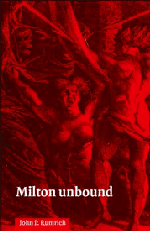4 - “Comus”: a fit of the mother
Published online by Cambridge University Press: 30 September 2009
Summary
Artemis and Hecate are one
Marija GimbutasIt is appropriate that a psychoanalytic assessment of Milton should stand at the heart of this book, despite the vulnerability of such methodology to speculation and anachronism. To address the invented Milton adequately – to account for the egregious didactic persona we have imposed on his poetry – it seems obligatory to work at the interpretive place where the ineffable phenomenon of personality has been extracted from the textual record and synthesized for conversion into contemporary theory. That interpretive place lies in the domain of psychoanalysis. My argument thus far has been that undue stress on the Oedipus complex – the Freudian drama of law and desire – validates our mistaken reading of Milton as the punitive voice of Christian didacticism. I want now to take that argument in a more positive direction.
The clearest case for the Oedipus complex as an interpretive key for Milton and his works appears in Kerrigan's reading of Comus. Much about the masque recommends such a reading. For Freud, a child's internalization of parental authority – the installation of the superego – is the developmental consequence of the Oedipus complex. In Milton's masque, the Earl of Bridgewater's children appear in the forest alone, at night, away from parental authority, and with only the light of their own consciences to guide them. The Lady's temptation by an enchanter who brandishes an astonishing wand is nevertheless “secretly” witnessed by an audience that includes her parents, particularly her father enthroned with his “new-entrusted Scepter” (line 36).
It is not merely the theatrical conditions that make an Oedipal reading seem plausible, but also the pertinence of the masque to the particulars of young Milton's life.
- Type
- Chapter
- Information
- Milton UnboundControversy and Reinterpretation, pp. 70 - 93Publisher: Cambridge University PressPrint publication year: 1996



